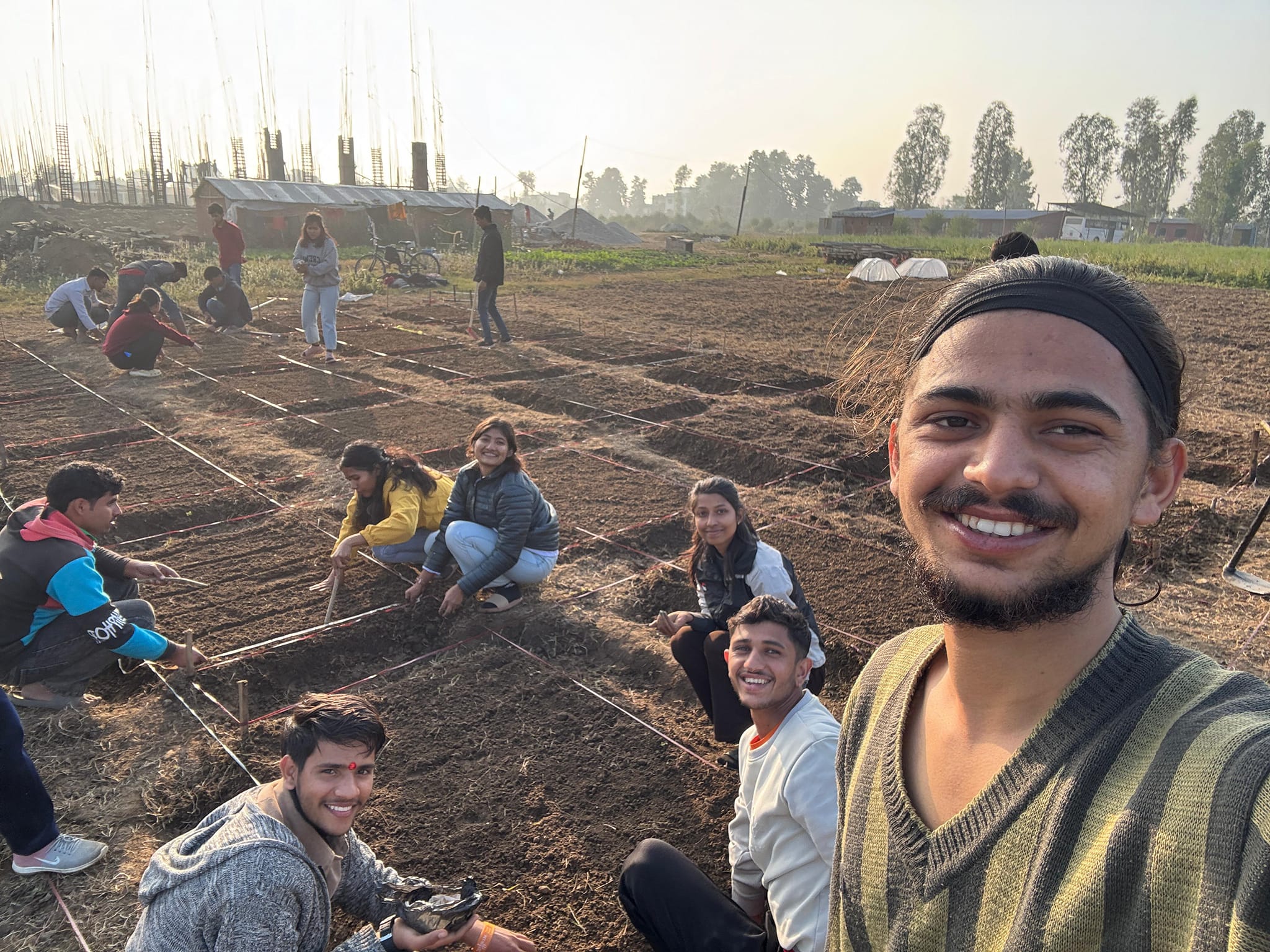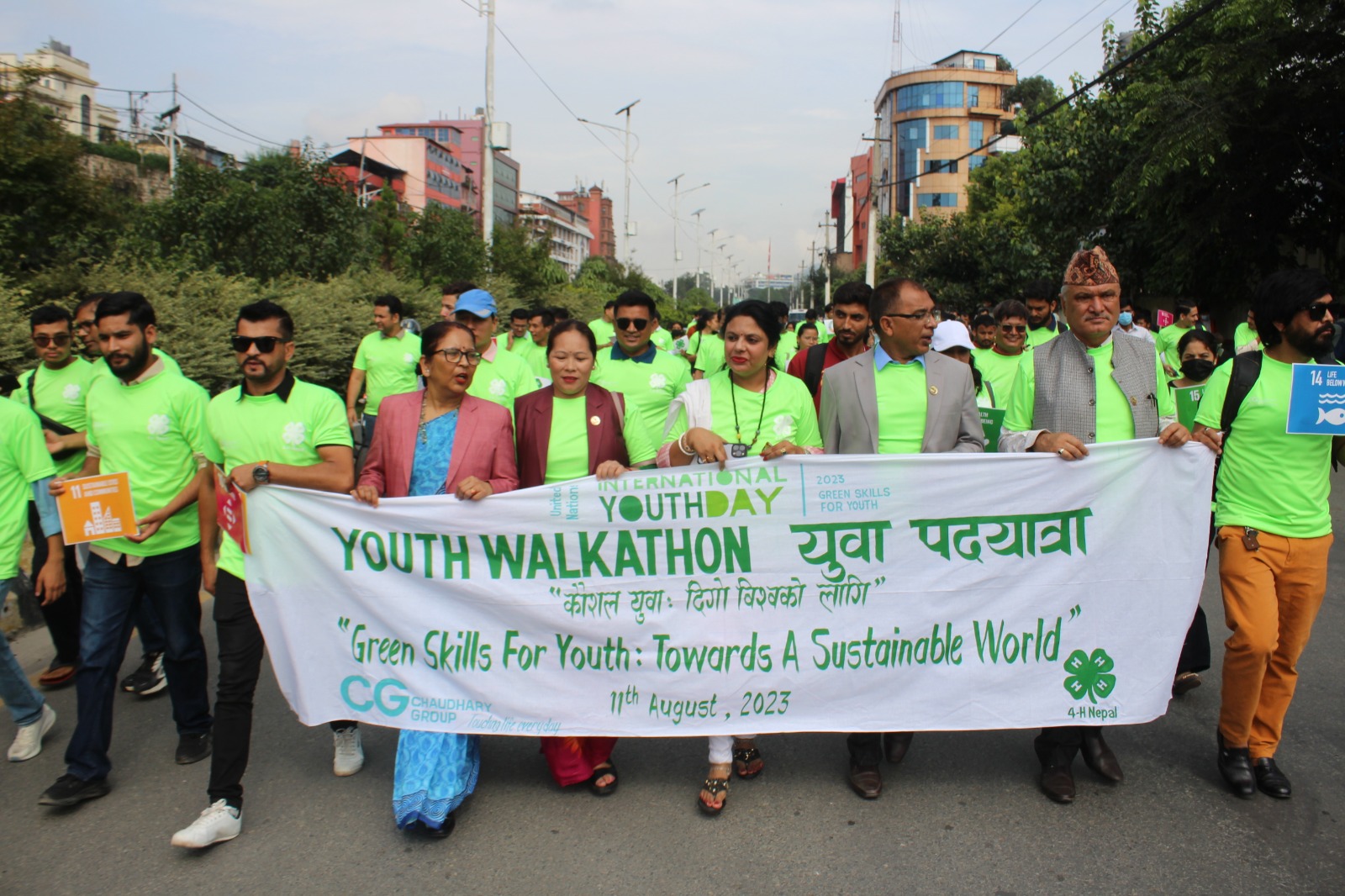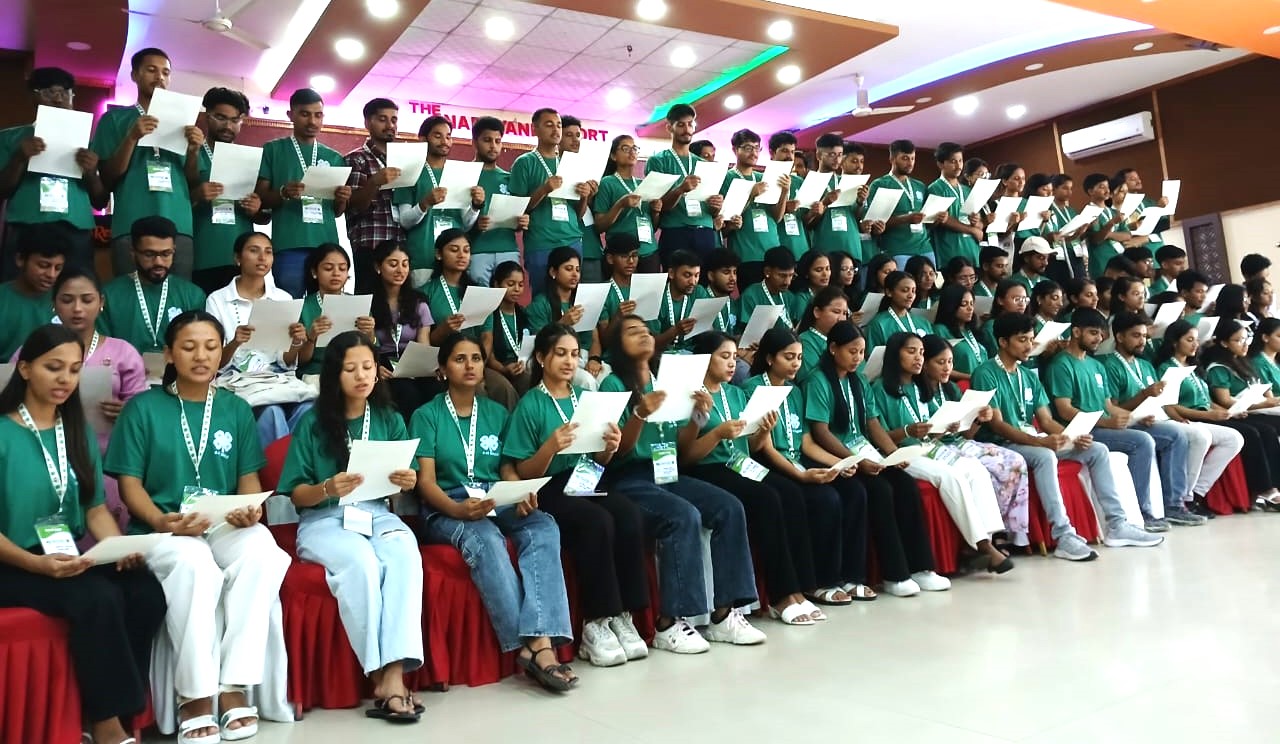4-H around the world: Nepal — Part 2
Let’s continue to explore 4-H in Nepal and what it looks like. 4-H is connecting to young people for a better Nepal.

“4-H around the world: Nepal – Part 1” focused on what 4-H in Nepal looks like. With its unique flag, this country has a unique group of 4-H volunteers. After reading Part 1, did you notice that 4-H Nepal has the same tools for positive youth development as Michigan 4-H? 4-H Nepal President Lok Raj Awasthi shared what 4-H looks like in Nepal with an introduction, objectives, organizational development and more. In Part 2, he will discuss the 4-H youth volunteerism, democracy, civic education and more. These programs have adapted since the April 2015 earthquake and the COVID-19 pandemic.
Gender Equality and Social Inclusion
4-H Nepal trained almost 680 local leaders (deputy mayor, deputy chairperson, ward representatives and government officials), including women, marginalized people and key stakeholders, on gender equality and social inclusion (GESI) in provincial governments' decision-making and development process. Intensive discussions were held to explore the meaningful participation of women and marginalized people in the budgeting and implementation of targeted programs at the provincial governments. 4-H Nepal conducted a GESI audit in 22 municipalities and eight ministries over three years, partnering with the Province Training Academy (PTA) and provincial governments.
Democracy and Civic Education
4-H Nepal has organized several awareness campaigns and capacity-building training for the youth, provided them with life skills, and facilitated them with the concept of democracy, good governance, free and fair elections, and their mobilization in the observation of the local, provincial and federal elections held in Nepal. 4-H Nepal observed the local and federal-provincial elections in 2074 and 2079 (Nepalese calendar) all over Nepal. The first-time campaign mobilized young people for election observation in the under-30 age group. In total they had 47 workshops, 1,200 participants, 57 partnership agencies and 64 working days.
-
Youth Participation in Election Observation - 2017
The 4-H Nepal observed all the local, provincial and federal elections in 2017 in 56 districts. With the coordination of 4-H Nepal, the Election Commission of Nepal (ECN) provided an orientation to the observers to facilitate their understanding of the elections, their procedures, and their different aspects to ensure free and fair elections.
-
Youth Participation in Election Observation - 2022
Federal-provincial and Local elections in 2022 have been held in all the districts of Nepal. 4-H Nepal received permission for election observation from the Election Commission, and 534 observers were delegated to more than 250 polling stations in 39 districts. This election has ensured the continuity of the local-level government.
Highlights of election observation (Local, Provincial and Federal)
Coverage districts: 62
Mobilize youth observers: 3,818
Captured total election booths: 2,500
Conducting voter education trainings: 56
Published press releases: 12
Partnerships/collaborations: 11
-
E-Rickshaw Voter Education Campaign
E-Rickshaw Voter Education Campaign trained volunteers were divided into 28 groups from the same district, each consisting of two males and one female. The program lasted a day and ended with disseminating information about things to be taken in the election. The same process continued for three days. In total, 4,200+ people were assisted and 84 communities were reached.
Highlights of the Voter Education Program
- Beneficiaries reached: 4,501
- Participants:
- Male: 2,188
- Female: 2,407
- Volunteers mobilized: 56
- Districts covered: 7
- Support received from IFES
Youth and Agriculture Entrepreneurship
Youth and Agro-Entrepreneurship
A Training of Trainers (ToT) entitled 'Youth Empowerment through Agriculture-based Entrepreneurship Development' was taught to 48 young entrepreneurs in Ramechhap from March 17 - 27, 2016. Tiffany A. Drape, senior research associate of Virginia Tech, USA, facilitated the training with support from Winrock International.
Youth Agro Conference
4-H Nepal organized two national youth-agro entrepreneurship symposiums. The Asian Agriculture Summit and Expo aimed to encourage youth involvement in agriculture, build a youth network, and share ideas and experiences of experts, farmers, entrepreneurs, and policymakers on agriculture and agricultural entrepreneurship. The conferences were coordinated with government agencies and like-minded organizations among 475 youth across Nepal.
.jpg?language_id=1)
First Youth Agriculture Entrepreneurship Conference - 2016
4-H Nepal organized the first Agro Entrepreneurship Symposium in Kathmandu in July 2016. Youth entrepreneurs, agriculture enthusiasts, experts from various sectors, representatives from government authorities, civil society organizations, and farmers’ organizations shared their experiences, learning, and skills among the participants in the conference. They formed a loose network entitled ‘Youth Agro Entrepreneurs Association.’
Second Youth Agro-Entrepreneurship Symposium - 2018
4-H Nepal, in collaboration with partners, organized the second Youth Agro Entrepreneurship Symposium at Nepal Tourism Board, Kathmandu, from May 20-21, 2018. The symposium had a vision and slogan: Educate, Advocate, and Communicate: Empowering Youth in Agriculture. Participants included youth entrepreneurs, enthusiasts and experts from across the country.
The Asian Agriculture Summit and Expo
4-H Nepal, in collaboration with partners, organized ‘The Asian Agriculture Summit and Exhibition (AASE)-2019’ at Hotel Himalaya, Lalitpur, from August 11-13, 2019. The summit was organized with the motto of revitalizing agri-youth entrepreneurship in Asia. At the summit, 120 delegates from 23 countries participated at Hotel Himalaya in Lalitpur.
Agriculture Policy and Dialogue
A policy dialogue on youth and agriculture was organized in Kathmandu to discuss the status of agriculture in Nepal and the engagement of youth in agriculture. Agricultural experts, representatives of the Federation of Nepalese Chambers of Commerce and Industries (FNCCI), and the National Planning Commission made separate presentations in the policy dialogue and encouraged youth to actively participate in agriculture.
Youth Development and Volunteerism
Empowering the Leaders of Tomorrow
On 3rd Shrawan, 4-H IAAS Nepal had the privilege of engaging with the bright minds of Grade 9 students at “Aadrasha Bal Secondary School, Sundarbazar.” Through a captivating program, we delved into the critical topic of 'Impact of Climate Change in Agriculture', arming these young minds with knowledge that will shape a more sustainable future.
Youth Walkathon and Signature Campaign for Green Development
4-H Nepal and Asia 4-H Network organized a Walkathon on International Youth Day on August 11, 2023 in Kathmandu. In the walkathon, 125 youths, parliamentarians, policymakers and other stakeholders participated. The Walkathon was opened by the Honorable Minister Dig Bahadur Limbu, who signed on the banner for Sustainable Development Goals (SDGs) with strong commitment.
One Month: The Agro-Insights series by the Social Media
“The Agri-Insights Series, "presented by the 4-H Nepal lAAS Section Lamjung, is pleased to bring to you the topic "Bacillus Thrungenesis to control pest.” This week's Agri-Insights aims to provide valuable knowledge and practical advice to help farmers learn and understand the importance of 'Bacillus Thrungenesis biopesticide to control insect pests and protect their main crops.
Campaign for against Gender-Based Violence (GBV)
Marking 16 days of activism against gender-based violence, 4-H Nepal AFU Rampur, in collaboration with the Social Changemakers and Innovators (Sochai - Youth For Nutrition and Rampur Youth Network, organized 'Run for #EndingGBV' activity under the #Orangetheworld #EndGBV Campaign.
Day Celebration
The 4-H Nepal observes different international days to express its solidarity with the days' messages. Since its inception in Nepal, 4-H Nepal has been observing International Youth Day, Democracy Day, World Environment Day, and World Tobacco Day, among others. By celebrating these days, 4-H Nepal believes that such celebrations help to make people aware.

Compost Fertilizer and School Gardening Training
The 4-H Nepal IAAS section, Tribhuwan University, has been providing training on agriculture to different schools in the Lamjung district. It taught students about compost fertilizers and demonstrated how to make them. The IAAS section also conducted awareness activities to promote the children’s health, hygiene, and nutrition (HYN) program.
Social Media Campaign
4-H Nepal has a Facebook and Twitter page to widely disseminate its campaigns, programs, activities, and events. The Facebook page broadcasts live events like youth conferences and policy dialogues organized by 4-H Nepal and its sister wings.
Earthquake and Youth Volunteerism
4-H Nepal has been established as a pioneer organization in Nepal to promote the concept of volunteerism among youth regarding providing humanitarian support during natural calamities and crises in the country. It also mobilizes volunteers for awareness, community development, and promotion of life skills among youth. 4-H Nepal develops volunteers with regular training, mentoring, coaching, exchange visits and experience-sharing sessions.
Highlights of Youth Volunteerism
- Rescue, relief and reconstruction in earthquake: 567
- Bagmati Cleaning Campaigns: 294
- Election Observations: 3,818
- E-rickshaw voter education campaigns: 56
- Total volunteer mobilization youth contributions in the community: 4,735
Immediately after the 7.8 magnitude earthquake struck Nepal in 2015, the 4-H national team and its volunteers, in coordination with the Nepal Army, Nepal Police and Armed Police Force (APF), rescued children and elderly citizens in Kathmandu and Bhaktapur within 24 hours. 4-H Nepal carried out a one-day rescue in Binayak Hospital, Balaju. 4-H President Lok Raj Awasthi, Treasurer Asmita Khadka, and Secretary Arjun Dahal led the rescue campaign at the central level with 20 youth volunteers and the construction of schools and buildings.
The Third Agri-Climate Youth Leadership Summit 2024
The 3rd Agri-Climate Youth Leadership Summit was meticulously designed, engineered, and executed to promote the overall development of youth and aspiring youth leaders. The summit was lively and vibrant, with props, logistics and other associated infrastructure, including mentors, resource persons and paper presenters, available on the spot. The summit commenced with a networking session as an ice-breaking event and continued from June 27–29, 2024, in Chitwan for three days filled with fun and insightful activities.
Policy Influence
The Governor of Bagmati Province, Honorable Yadav Chandra Sharma, and Honorable Ananda Kumar Shrestha, the Chair of the Industry, Tourism, and Environment Committee of the Bagmati Pradesh Sabha, committed to addressing youth and climate-related issues in provincial policies. Additionally, the Vice-President of the Bagmati Province Youth Council, Santosh Chaulagain, dedicated himself to addressing climate change and green agriculture issues in the upcoming national youth policy, indicating a direct influence on policymaking.
Youth Engagement and Leadership
One hundred participants were selected as Youth Eco Leaders, pledging to advocate for agri-climate issues and work in an environmentally-friendly manner. This initiative empowered young individuals to take active roles in environmental advocacy.
Awareness and Knowledge Sharing
Presentations on vedic agriculture, agriculture and climate-related problems and climate justice increased awareness and provided participants with critical knowledge on these issues.
Green Youth Gosthi Workshop
The formation of ten groups to discuss ten different topics related to agriculture, climate change, and youth issues facilitated in-depth discussions and idea generation on these subjects.
Recognition and Motivation
The Pitch Agri-Climate Hack (PACH) Competition recognized innovative ideas from ten participants, awarding them 10,000 Rs each, encouraging and motivating young innovators in the agri-climate field.
Art and Cultural Enrichment
The digital art display and Ghatu cultural dance performance enriched the event by integrating cultural elements, enhancing the overall experience for participants.
Commitment to Environmental Projects
The signing of the sankalpa patra by 100 Youth Eco Leaders demonstrated a strong commitment to working on green and eco-friendly projects, fostering a sense of responsibility and accountability among the youth.

Formation 100 YOUTH ECO LEADERS NETWORK
A Youth Network is a formal or informal platform designed to unify and amplify the voices of young people at local, national, regional, and global levels. The 100 Youth Eco Leader Network is a dynamic and diverse community comprising 100 youths from over 60 districts across Nepal. This network includes individuals from a range of disciplines such as agriculture, social science, law, engineering, medicine and journalism, with a significant representation from marginalized communities, including Madhesi, Janajati, and Dalit, underscoring its commitment to inclusivity. Established by 4-H Nepal, the network emerged as a pivotal outcome of the third AG Climate Youth Leadership Summit, held from June 27-29, 2024, in Chitwan. The formation of this network on June 29, 2024, concluded one of the summit’s 11 essential activities.
4-H is going strong in Nepal and around the world! Michigan 4-H is excited to continue exploring 4-H globally, nationally and internationally! To follow this MSU Extension article series exploring 4-H worldwide, refer to the other articles below.
Michigan State University Extension and the Michigan 4-H Youth Development program help to prepare youth as positive and engaged leaders and global citizens by providing educational experiences and resources for youth interested in developing knowledge and skills in these areas. For more information about 4-H learning opportunities and other 4-H programs, contact your local MSU Extension office. Visit the Michigan 4-H International Exchange Programs for information on hosting exchange students or traveling. Other global educational opportunities can also be found on the MSU Extension Global and Cultural Education webpage.
Other articles in this series



 Print
Print Email
Email

